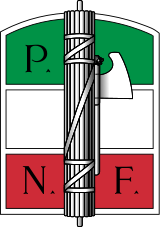Partito Nazional Fascista
|
National Fascist Party
Partito Nazionale Fascista |
|
|---|---|
 |
|
| Duce and founder | Benito Mussolini |
| Historical secretaries | See list |
| Founded | 9 November 1921 |
| Dissolved | 27 July 1943 |
| Merger of |
Italian Fasci of Combat, Italian Nationalist Association |
| Succeeded by | Republican Fascist Party |
| Headquarters |
Palazzo della Farnesina Via della Lungara, 230 Rome, Italy |
| Newspaper | Il Popolo d'Italia |
| Student wing | Gruppi Universitari Fascisti |
| Youth wing |
Opera Nazionale Balilla Gioventù Italiana del Littorio |
| Paramilitary wing | Milizia Volontaria per la Sicurezza Nazionale |
| Trade Union wing |
Opera Nazionale Dopolavoro Confederazione Generale del Lavoro |
| Membership (1939) | 6,000,000 |
| Ideology |
Italian Fascism Ultranationalism Imperialism |
| Political position | Far-right |
| National affiliation |
National Blocs (1921) National List (1924) |
| Colors | Black |
| Slogan | "Credere, Obbedire, Combattere" ("Believe, Obey, Fight") |
| Anthem | Giovinezza |
| Party flag | |
 |
|
The National Fascist Party (Partito Nazionale Fascista, PNF) was an Italian political party, created by Benito Mussolini as the political expression of fascism (previously represented by groups known as Fasci). The party ruled Italy from 1922 when Fascists took power with the March on Rome, to 1943, when Mussolini was deposed by the Grand Council of Fascism.
Preceding the PNF, Mussolini's first established political party was known as the "Fascist Revolutionary Party" (Partito Fascista Rivoluzionario, PFR), which was, according to Mussolini, founded in 1915. After poor November 1919 election results, the PFR was eventually renamed the National Fascist Party in 1921.
The National Fascist Party was rooted in Italian nationalism and the desire to restore and expand Italian territories, which Italian Fascists deemed necessary for a nation to assert its superiority and strength and to avoid succumbing to decay. Italian Fascists claimed that modern Italy is the heir to ancient Rome and its legacy, and historically supported the creation of an Italian Empire to provide spazio vitale ("living space") for colonization by Italian settlers and to establish control over the Mediterranean Sea.
Fascists promoted a corporatist economic system whereby employer and employee syndicates are linked together in associations to collectively represent the nation's economic producers and work alongside the state to set national economic policy. This economic system intended to resolve class conflict through collaboration between the classes.
...
Wikipedia
